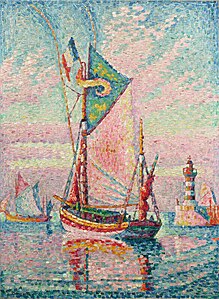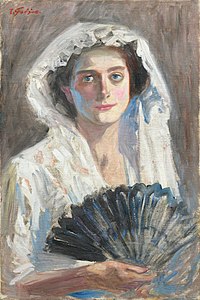 The Artizon Museum in its new location The Artizon Museum in its new location | |
| Interactive fullscreen map | |
| Location | Tokyo, Japan |
|---|---|
| Coordinates | 35°40′44″N 139°46′19″E / 35.67889°N 139.77194°E / 35.67889; 139.77194 |
Artizon Museum Aatizon Bijutukan (アーティゾン美術館), until 2018 Bridgestone Museum of Art (ブリヂストン美術館, Burijisuton Bijutsukan), is an art museum in Tokyo, Japan.
The museum was founded in 1952 by the founder of Bridgestone Tire Co., Ishibashi Shojiro (his family name means stone bridge). The museum's collections include Impressionists, Post-Impressionists and twentieth-century art by Japanese, European and American artists, as well as ceramic works from Ancient Greece. The museum was located in the headquarters of the Bridgestone Corporation in Chūō, Tokyo.
Closure and eventual reopening
The museum closed its doors on 18 May 2015 in order to make way for the construction of a new building, to where the museum would be relocated, reopening in January 2020. Construction of the new building (tentatively named the Nagasaka Sangyo Kyobashi Building) begun with a groundbreaking ceremony on June 17, 2016 and was completed in 2019. The museum's new name was announced in 2018, combining the words "art" and "horizon". During the long-term closure, various items from the museum's collection have been loaned out for display in other institutions.
Selected artists
- Edgar Degas
- Pierre-Auguste Renoir
- Camille Pissarro
- Édouard Manet
- Vincent van Gogh
- Paul Gauguin
- Gustave Moreau
- Paul Cézanne
- Claude Monet
- Amedeo Clemente Modigliani
- Maurice Denis
- Georges Rouault
- Pablo Picasso
- Paul Klee
- Narashige Koide
- Tsuguharu Foujita
- Fujishima Takeji
- Shigeru Aoki
Selected collection highlights
-
 Young Man Playing the Piano, Gustave Caillebotte
Young Man Playing the Piano, Gustave Caillebotte
-
 Still Life with Flowers, Fruits, Wineglass and Tea Cup, Henri Fantin-Latour
Still Life with Flowers, Fruits, Wineglass and Tea Cup, Henri Fantin-Latour
-
 Water-Lilies, Claude Monet
Water-Lilies, Claude Monet
-
 Vegetable garden, Camille Pissarro
Vegetable garden, Camille Pissarro
-
 Woman and child on a balcony, Berthe Morisot
Woman and child on a balcony, Berthe Morisot
-
 Augusta Reading to Her Daughter, Mary Cassatt
Augusta Reading to Her Daughter, Mary Cassatt
-
 Sleep, Eva Gonzalès
Sleep, Eva Gonzalès
-
 Georgette Charpentier, Pierre-Auguste Renoir.
Georgette Charpentier, Pierre-Auguste Renoir.
-
 La Toilette, Gustave Moreau
La Toilette, Gustave Moreau
-
 June Morning in Saint-Mammès, Alfred Sisley
June Morning in Saint-Mammès, Alfred Sisley
-
 Port of Concarneau, Paul Signac
Port of Concarneau, Paul Signac
-
 Portrait of a Young Woman, Paul Gauguin
Portrait of a Young Woman, Paul Gauguin
-
 Mont Sainte-Victoire and Château Noir, Paul Cezanne
Mont Sainte-Victoire and Château Noir, Paul Cezanne
-
 Spring, Sesshū Tōyō
Spring, Sesshū Tōyō
-
 Views in and around the City of Kyoto, Unknown Edo period artist
Views in and around the City of Kyoto, Unknown Edo period artist
-
 Peony and Peacocks, Maruyama Ōkyo
Peony and Peacocks, Maruyama Ōkyo
-
 Black Fan, Fujishima Takeji
Black Fan, Fujishima Takeji
-
 Self-Portrait with a Hat, Koide Narashige
Self-Portrait with a Hat, Koide Narashige
-
 Roses, Yasui Sotaro
Roses, Yasui Sotaro
Ishibashi Foundation Art Research Center
The Ishibashi Foundation Art Research Center (石橋財団アートリサーチセンター) opened in Machida in 2015 as a research facility for the Artizon Museum. Focused upon the research, storage, and preservation and restoration of the collection, since 2017 school groups have been welcomed, there are also lectures and workshops for the public, and a library open to researchers.
See also
References
- Nussbaum, Louis-Frédéric. (2005). "Museums" in Japan Encyclopedia, pp. 671-673.
- Dunn, Michael (May 4, 2006). "Bridgestone museum celebrates 50th anniversary". The Japan Times. The Japan Times, Ltd. Retrieved 4 December 2011.
- "Announcement: We will close for renovation on May 18". Bridgestone Museum of Art. 18 November 2014. Archived from the original on 2 April 2015. Retrieved 9 April 2015.
- "Construction Begins on the New Bridgestone Museum of Art". Bridgestone Museum of Art. 17 June 2016. Retrieved 16 March 2017.
- "Concept | Artizon Museum". 26 July 2020.
- "About Us | Artizon Museum". 26 July 2020.
- "Works on loan to other museums". Bridgestone Museum of Art. Archived from the original on 25 December 2015. Retrieved 11 September 2015.
- Wada, Yuhei (January 21, 2011). "'Why is it Masterwork?'". The Japan Times. The Japan Times, Ltd. Retrieved 4 December 2011.
- 石橋財団アートリサーチセンター [Ishibashi Foundation Art Research Center] (in Japanese). Artizon Museum, Ishibashi Foundation. Retrieved 16 July 2020.
External links
- Artizon Museum
- former Bridgestone Museum of Art
- Artizon Museum within Google Arts & Culture
 Media related to Artizon Museum at Wikimedia Commons
Media related to Artizon Museum at Wikimedia Commons
This article related to art or architecture in Japan is a stub. You can help Misplaced Pages by expanding it. |
This article related to a museum in Japan is a stub. You can help Misplaced Pages by expanding it. |